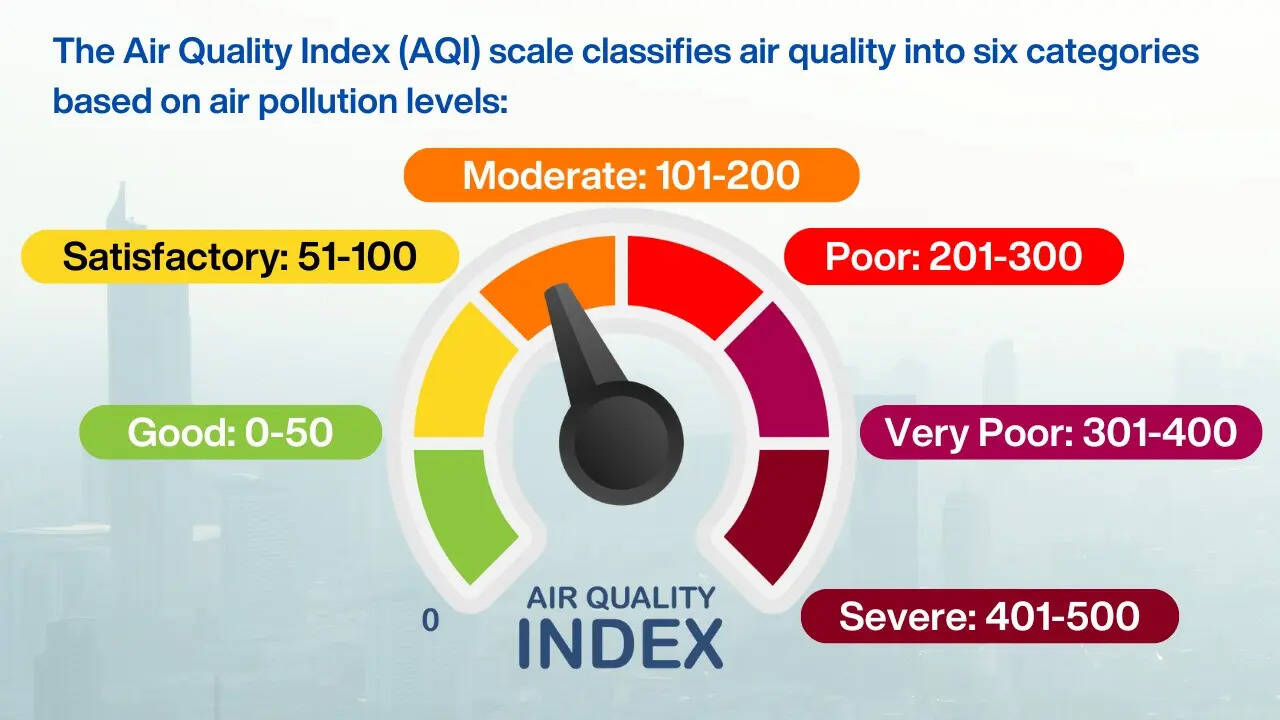- Health Conditions A-Z
- Health & Wellness
- Nutrition
- Fitness
- Health News
- Ayurveda
- Videos
- Medicine A-Z
- Parenting
Delhi Pollution Is Causing Health Issues Not Seen Before

The air quality index (AQI) has worsened in Delhi-NCR in the past few days with the Commission for Air Quality Management (CAQM) invoking stage two of the anti-pollution plan Graded Response Action Plan (GRAP). Doctors and experts have also taken note of the rise in pollution, and have observed diseases they have not seen before.
Dr Sanjay Jain, a Delhi-based ENT and a member of DocTube also noted an increase in the number of patients with respiratory issues. "I have seen a notable increase in patients with upper respiratory tract infections, chronic sinusitis, and allergic rhinitis, which are directly linked to rising pollution levels," he says. From his experience, he has noticed a rough increase of 30 to 40% of patients with pollution-related ENT issues.
What Is The Administration Doing?
As per the System of Air Quality and Weather Forecasting and Research (SAFAR), the AQI in Delhi at 8 am today was recorded at 317, which falls under the "very poor" category. The India Meteorological Department (IMD) has predicted that the average AQI will stay in the "very poor" category in the coming days.

GRAP accounts for the restrictions on the usage of coal and firewood, and diesel generator sets in the Delhi-NCR. Furthermore, plans for mechanical sweeping and water sprinkling on the identified roads will also be carried on a daily basis. The plan expands to dust control measures at the construction and demolition sites too.
Parking fees will also be increased to discourage private transport with additional buses and metro services to start soon.
Source Of Pollution
A study titled What Is Polluting Delhi's Air? A Review from 1990 to 2022 mentions that Delhi's major contributor is road transport, while the second major factor comes from burning agricultural waste or stubble. Other factors like waste management, the construction sector, roads, and firecrackers during Diwali also lead to the increase in pollution.
Health Issues
Delhi pollution is more dangerous than we think. Not just breathing issues, but it can also lead to lung cancer and heart diseases. Studies have shown that prolonged exposure to pollution can lead to a reduction in lung function and also premature death, especially in children. It can also lead to increased risks of stroke, cognitive decline, and even pregnancy complications.
Doctors also take note of other pollution-related issues that were not seen before or are unusual. Dr Jain says that prolonged exposure to pollution can cause chronic ear infections in children due to inflammation in the Eustachian tube. "This is not commonly recognised by the people," he says. Dr Brunda MS, senior consultant, of internal medicine at Aster CMI Hospital in Bengaluru also explains that many people remain unaware of the health issues associated with pollution. Apart from shortness of breath, environmental toxins can cause brain diseases and reproductive health issues. "The subtle and slow effects of pollution often lead Understanding these relationships can help communities promote cleaner, more resilient environments," explains the doctor.
The doctor also explains the impact of pollution on the eyes as it can cause conjunctivitis or worsen any pre-existing eye infection. Dr Brunda MS also mentions that air pollution is responsible for 1.67 million deaths in India, which is 17.8% of the total deaths in the country. "There has been a 3 to 4% increase in a number of cases because of pollution," the doctor explains.
How To Stay Safe?
Dr Jain explains the precautions one can take to stay safe and prevent these diseases from happening. "Individuals can protect themselves by wearing masks, using air purifiers at home, avoiding outdoor activities during high-pollution days, and maintaining a healthy lifestyle," he explains.
The doctors also recommend wearing N95 masks, surgical masks or equivalent for effective filtration of airborne particles, consuming warm fluids and herbal teas and eating food rich in vitamin C and antioxidants that will help reduce inflammation and protect mucous membranes in the throat.
Having An Irregular Heartbeat Is A Sign Of A Future Stroke, Experts Warn

Credit: Canva
Atrial fibrillation (AFib) is an irregular and often very rapid heart rhythm, also called an arrhythmia and can create blood clots in the heart, which can increase your risk of having a stroke by five times.
When a person has AFib, the normal beating in the upper chambers of the heart (the two atria) is irregular and blood doesn't flow as well as it should from the atria to the lower chambers of the heart (the two ventricles).
In this case, the risk of developing blood clots in your heart increases, which can not only cause a heart attack but also damage vital organs such as your brain. An AFib may happen in brief episodes, or it may be a permanent condition.
Common symptoms include palpitations (the feeling that your heart is racing, pounding, fluttering or like you have missed heartbeats), chest pain, finding it harder to exercise, tiredness, shortness of breath, dizziness or feeling faint.
READ MORE: You Can Stop A Heart Attack With This Medicine, Cardiologist Reveals Heart Attack 101
The death rate from AFib as the primary or a contributing cause of death has been rising for more than two decades.
Over 454,000 people with AFib are hospitalized in the US each year, out of which 158,000 die of the cause. It is estimated that 12.1 million people in the US will have AFib in the US will have AFib by 2050.
Who Is At Risk Of Having AFib?
Risk factors for AFib include:- Advancing age.
- High blood pressure.
- Obesity.
- European ancestry.
- Diabetes.
- Heart failure.
- Ischemic heart disease.
- Hyperthyroidism.
- Chronic kidney disease.
- Moderate to heavy alcohol use.
- Smoking.
- Enlargement of the chambers on the left side of the heart.
Treatment for AFib includes medications to control the heart's rhythm and rate, therapy to shock the heart back to a regular rhythm and procedures to block faulty heart signals.
A person with atrial fibrillation also may have a related heart rhythm disorder called atrial flutter. The treatments for AFib and atrial flutter are similar.
How To Improve Your Heart Health
Experts recommend following the below to reduce yor risk of stroke or developing AFib and maintaining heart health:
- Don't smoke or use tobacco.
- Aim for at least 150 minutes of moderate physical activity or 75 minutes of vigorous physical activity (or an equal combination of both) each week. Eat a heart-healthy diet.
- Stay at a healthy weight.
- Get quality sleep.
- Manage stress levels
- Get regular health screening tests.
- Eat a fiber, nuts and fish-rich diet
- Limit salt intake
- Reduce saturated fat intake
Can Your Voice Predict Future Chronic Disease Risk?

Credit: Canva
Changes in your voice, whether in tone, volume, speed or overall quality, can act as early warning signs for a wide range of medical conditions, experts say.
Your voice is produced by the coordinated effort of your respiratory system, vocal cords (also called vocal folds), and the resonating chambers of your throat, mouth, and nose. Even subtle shifts in hormone levels, hydration status or tissue health can noticeably affect how you sound.
Recent research shows that subtle changes in speech, for example, slurring or vocal cord tremors, may be signs of disease or illness like Parkinson’s disease, depression, cardiac and mental health problems, as speech requires coordination with the brain, muscles and respiratory system.
Which Conditions Can You Identify By A Change In Voice?
- Diabetes: High-pitched, raspy voices or vocal strain can be linked to diabetes, with AI studies showing up to 75% accuracy in prediction.
- Cardiovascular Disease: Voice analysis can detect high, fluttering voices associated with coronary artery disease, caused by stress or fluid changes in the vocal cords.
- Hypothyroidism: A deeper, softer, or huskier voice can indicate thyroid dysfunction.
- Respiratory Illnesses: Conditions like COVID-19 or COPD are often associated with a breathy voice, coughing, and short, interrupted sentences.
- Throat Cancer: Persistent hoarseness and raspy voice, especially lasting more than 2-3 weeks, can indicate laryngeal cancer.
- Parkinson’s Disease: Identified by a monotone voice, reduced volume, increased breathiness, and vocal cord tremors.
- Alzheimer’s Disease/Dementia: Characterized by slower speech rates, hesitation, frequent pauses, and simplified vocabulary/sentence structure.
- Stroke or Brain Injury: Indicated by slurred speech or difficulty finding words (global aphasia).
- Cerebellar Disorders (caused by damage to the nerves in the brain's cerebellum): Manifest as loud, staccato speech (bursts of broken sounds).
- Depression: Linked to a flatter, softer, and more monotone voice with a reduced pitch range.
- Anxiety/Stress: Often presents as a higher-pitched, faster, and more tremulous voice.
- Schizophrenia: Indicated by monotone, disorganized speech.
What Else Can Affect Your Voice?
Apart from serious medical conditions, voice changes may also be linked to aging and lifestyle factors. Fluctuations in testosterone, estrogen, progesterone, and thyroid hormone levels may also influence the structure and function of the vocal cords.
Dehydration is one of the most common causes of voice problems, as cords need adequate moisture to vibrate efficiently. Aim for at least 64 ounces of water daily, and more if you use your voice professionally or live in a dry climate.
Smoking irritates and inflames the vocal cords, causing chronic hoarseness and increasing the risk of vocal cord cancer. Even secondhand smoke and vaping can affect voice quality.
Diet also plays a role in vocal health. Caffeine and alcohol are diuretics that can dehydrate your vocal cords. Spicy foods and acidic beverages may trigger reflux, irritating the throat.
Dairy products can increase mucus production in some people, affecting voice clarity. Voice overuse or misuse, common in teachers, singers, and public speakers, can lead to vocal fatigue and damage. The following table compares how different lifestyle factors impact your voice.
How Can You Take Care Of Your Voice?
Whether the cause is hormonal changes, medical conditions, aging, or lifestyle factors, most voice problems can be improved with proper diagnosis and treatment. Here are some things you can do to take care:
- Stay hydrated by drinking water throughout the day and using a humidifier in dry environments
- Warm up your voice before extended speaking or singing with gentle humming or lip trills
- Avoid shouting or whispering, both of which strain the vocal cords
- Take voice breaks during prolonged speaking to prevent fatigue
- Manage stress through relaxation techniques, as tension affects voice quality
- Treat allergies and sinus problems promptly to reduce postnasal drip
- Maintain good posture to support optimal breathing and voice production
Feeling Lonely Or Judged Raises Risk of Dementia, Study Suggests

Credit: Canva
Living under constant psychosocial stress can significantly raise the risk of developing dementia and a stroke, a JAMA Network study suggests.
Psychosocial stress is a type of stress related to our relationships with others, usually arising from feeling judged, excluded, or not enough in others' eyes. It can also put a person in fight-or-flight mode, causing both mental and physical symptoms.
According to Chinese researchers, people who experience this form of stress in childhood as well as adulthood face more than a threefold higher risk of developing dementia compared with those in other groups.
Similarly, young people experiencing stressful situations in their adulthood had a significantly higher risk of stroke incidence that their counterparts.
Based on these results, the study highlights that early identification of psychosocial stressors, combined with effective mental health support and depression prevention, may reduce the long-term burden of neurodegenerative and cerebrovascular disease.
What Did The Study Find?
In this population-based cohort study of more than 11,600 middle-aged and older adults, nearly four in five participants reported at least one adverse childhood experience, while over one-third experienced adversity during adulthood.The scientists defined adverse childhood experiences (ACEs) as traumatic exposures occurring during childhood, typically grouped into 3 categories: household dysfunction, social dysfunction and family death or disability.
On the other hand, traumatic exposures occurring during adulthood were defined as adverse adult experiences (AAEs), which include events such as the death of a child, lifetime discrimination, ever being confined to bed, ever being hospitalized for a month or longer and ever leaving a job due to health conditions.
While analyzing the data they collected from the participants, the researchers also found that depression partly explained the links in all major relationships as it accounted for more than one-third of the connection between childhood adversity and dementia, and about one-fifth of the link between adulthood adversity and both dementia and stroke.
READ MORE: Avoid Doing These 3 Things Prevent Dementia, According To Neurologist
These findings suggest that long-term psychological stress may lead to brain and blood vessel diseases by causing ongoing emotional distress, unhealthy behaviours, and biological changes like inflammation and abnormal stress responses.
Psychosocial Stress: An Unseen Form Of Stress
Psychosocial stress can trigger physiological responses like increased heart rate, cortisol secretion, and inflammation, significantly increasing risks for hypertension, cardiovascular disease and mental health disorders.
This kind of stress can affect men, women, and people of all genders differently, but many of the symptoms are still the same. Common symptoms include:
- Sweating
- An increase in blood pressure
- Rapid heartbeat
- Dizziness
- Nausea and digestive problems
- Strong emotional reactions such as sadness or irritability
- Drug or alcohol abuse
These symptoms can be acute or chronic, meaning for some people they go away, and for others, they persist over a long period of time. Meeting with a therapist is often recommended for those living with chronic stress.
Experts typically suggest developing coping mechanisms include building support networks, utilizing relaxation techniques, and, in cases of severe mental impact, seeking professional support to help deal with psychosocial stress.
© 2024 Bennett, Coleman & Company Limited

